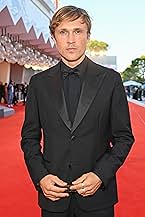AVALIAÇÃO DA IMDb
7,3/10
53 mil
SUA AVALIAÇÃO
Na Nápoles dos anos 80, um jovem louco por futebol se vê diante de uma tragédia familiar que define seu futuro incerto, porém promissor, como cineasta.Na Nápoles dos anos 80, um jovem louco por futebol se vê diante de uma tragédia familiar que define seu futuro incerto, porém promissor, como cineasta.Na Nápoles dos anos 80, um jovem louco por futebol se vê diante de uma tragédia familiar que define seu futuro incerto, porém promissor, como cineasta.
- Direção
- Roteirista
- Artistas
- Indicado a 1 Oscar
- 32 vitórias e 66 indicações no total
Betty Pedrazzi
- Baronessa Focale
- (as Betti Pedrazzi)
Avaliações em destaque
Although I have only an embryonic understanding of Italian, I felt the rhythm and mood of the scenes allowed me to feel the soul of Naples on a cellular level.
It's been a long time since I've seen a great italien film, and i always say this "Sorrentino is the closest we're ever gonna have to Fellini". One of the realest, saddest and funniest movies of 2021!
"Cinema is a distraction, reality is second-rate." Fellini (overheard in in this movie)
As Oscar-winning director Paolo Sorrentino's stand-in, Fabietto (Filippo Scotti), comes of age in The Hand of God, he experiences the vagaries and beauties of Neapolitan life, not the least of which is his growing love of cinema. While half way through he will experience a life-changing tragedy, he will throughout be an observer of Naples with its Fellini-like freaks and gorgeous gulf-coast scenery. In a way, this is Sorrentino's Amarcord.
The Hand of God is a title derived from the description of soccer god, Diego Maradona, and his magical, controversial goal in the 1986 World Cup quarterfinal. It also could refer to the Sistine Chapel's fingers, and many other references that bolster this luminous description of Sorrentino's early life in Naples.
When Fabietto sees his aunt, Patrizia (Luisa Ranieri), naked on occasion, Sorrentino shows the emerging appreciation of sexuality in a young-man's sensibility and the parallel lushness of Italy, whose food is legendary and sensuality eternal. Both his older brother Marchino (Marlon Joubert) and he are transfixed by the eroticism, which undoubtedly creeps into all of Sorrentino's work.
Patrizia fuels the erotic fantasies of Fabietto and his older brother Marchino (Marlon Joubert), an aspiring actor too conventionally handsome to be of interest to the great Fellini.
It's as if Sorrentino is saying that these images helped him form his cinematic persona and lifelong affection for his youth in a culturally-rich country. The appearance of a Neapolitan folklore hero, a child monk in a sumptuous palazzo with a deteriorating chandelier, is just one of the many images Sorrentino uses to emphasize the wealthy culture he grew up in.
In addition to the tragedy, Fabietto is most moved by an encounter at a shoot in the historic Galleria Umberto I with director Antonio Capuano (Ciro Capano), his future mentor, who explains cinema with a hard-nosed philosophy that incorporates individuality as the driving force. Upon giving himself to courage and perseverance, as director Capuano advises, Fabio will be a hope of Italian cinema, incorporating the lyrical jumble of happy images from his tender youth to the contemplative awareness in his growing years.
From the Felliniesque characters of his youth-circus-like fat women, goddess-like nymphs, and bold friends like Armando (Biaggio Manna-a John Belushi type), Fabio will break the bounds of domestic life and teen-age longings to strike out into a cinematic world that promises to be at least a distraction rather than a second-rate experience.
Sorrentino has been touched by the hand of God.
As Oscar-winning director Paolo Sorrentino's stand-in, Fabietto (Filippo Scotti), comes of age in The Hand of God, he experiences the vagaries and beauties of Neapolitan life, not the least of which is his growing love of cinema. While half way through he will experience a life-changing tragedy, he will throughout be an observer of Naples with its Fellini-like freaks and gorgeous gulf-coast scenery. In a way, this is Sorrentino's Amarcord.
The Hand of God is a title derived from the description of soccer god, Diego Maradona, and his magical, controversial goal in the 1986 World Cup quarterfinal. It also could refer to the Sistine Chapel's fingers, and many other references that bolster this luminous description of Sorrentino's early life in Naples.
When Fabietto sees his aunt, Patrizia (Luisa Ranieri), naked on occasion, Sorrentino shows the emerging appreciation of sexuality in a young-man's sensibility and the parallel lushness of Italy, whose food is legendary and sensuality eternal. Both his older brother Marchino (Marlon Joubert) and he are transfixed by the eroticism, which undoubtedly creeps into all of Sorrentino's work.
Patrizia fuels the erotic fantasies of Fabietto and his older brother Marchino (Marlon Joubert), an aspiring actor too conventionally handsome to be of interest to the great Fellini.
It's as if Sorrentino is saying that these images helped him form his cinematic persona and lifelong affection for his youth in a culturally-rich country. The appearance of a Neapolitan folklore hero, a child monk in a sumptuous palazzo with a deteriorating chandelier, is just one of the many images Sorrentino uses to emphasize the wealthy culture he grew up in.
In addition to the tragedy, Fabietto is most moved by an encounter at a shoot in the historic Galleria Umberto I with director Antonio Capuano (Ciro Capano), his future mentor, who explains cinema with a hard-nosed philosophy that incorporates individuality as the driving force. Upon giving himself to courage and perseverance, as director Capuano advises, Fabio will be a hope of Italian cinema, incorporating the lyrical jumble of happy images from his tender youth to the contemplative awareness in his growing years.
From the Felliniesque characters of his youth-circus-like fat women, goddess-like nymphs, and bold friends like Armando (Biaggio Manna-a John Belushi type), Fabio will break the bounds of domestic life and teen-age longings to strike out into a cinematic world that promises to be at least a distraction rather than a second-rate experience.
Sorrentino has been touched by the hand of God.
It is a very difficult challenge to try to lightly tell such a personal and traumatic drama as it happens in "The hand of God". The director Sorrentino tries to face it without veils and metaphors, keeping only his very personal taste for the grotesque and decadence because- as he tries to explain several times in the film- after the personal tragedy he experienced as a teenager, he no longer likes reality: "the reality is poor". Yet reality can also be extraordinary, so much so as to generate one of the best contemporary Italian directors from a such atrocious trauma.
For a reason I could never understand, everyone expected a "Rome" from Sorrentino. And out of every 5 reviews written about this movie, 4 of them mentioned the movie 'ROMA'.
Sorrentino made his own 'È stata la mano di Dio' rather than his own Rome, and he did it well.
I didn't want to watch this movie without a proper copy, when Netflix came to my rescue.
It was a beautiful film with everything from its editing to the role its screenplay plays in storytelling, from the angle choices of the cinematographer to the sometimes exaggerated and everywhere calm performances of the actors.
It's been a long time since I heard Italian "in a good sense" in the cinema.
And it was worth the wait.
Sorrentino made his own 'È stata la mano di Dio' rather than his own Rome, and he did it well.
I didn't want to watch this movie without a proper copy, when Netflix came to my rescue.
It was a beautiful film with everything from its editing to the role its screenplay plays in storytelling, from the angle choices of the cinematographer to the sometimes exaggerated and everywhere calm performances of the actors.
It's been a long time since I heard Italian "in a good sense" in the cinema.
And it was worth the wait.
Você sabia?
- CuriosidadesAccording to Paolo Sorrentino, it was Alfonso Cuarón's Roma (2018), which was based on Cuaron's childhood in Mexico City, that gave Sorrentino permission to commit his own experience to film. For Sorrentino realized that "a personal, private film could tell a universal story."
- Citações
Antonio Capuano: Remember, those without courage don't sleep with beautiful women.
- Trilhas sonorasNapule è
Written and performed by Pino Daniele
Principais escolhas
Faça login para avaliar e ver a lista de recomendações personalizadas
- How long is The Hand of God?Fornecido pela Alexa
Detalhes
- Data de lançamento
- Países de origem
- Central de atendimento oficial
- Idiomas
- Também conhecido como
- Fue la mano de Dios
- Locações de filme
- Empresas de produção
- Consulte mais créditos da empresa na IMDbPro
Bilheteria
- Orçamento
- € 13.049.974 (estimativa)
- Faturamento bruto mundial
- US$ 167.909
- Tempo de duração2 horas 10 minutos
- Cor
- Mixagem de som
- Proporção
- 2.39 : 1
Contribua para esta página
Sugerir uma alteração ou adicionar conteúdo ausente


































